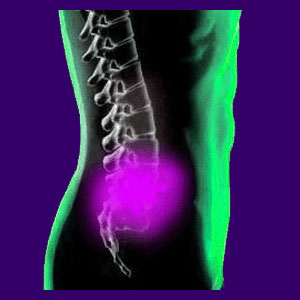
Spondylolisthesis symptoms are a controversial subject, since vertebral slippage is not generally a symptomatic condition in mild to moderate forms. In fact, you might be surprised to know that many people demonstrate significant degrees of spondylolisthesis and do not even know it. Others know that they have it, yet suffer no ill effects, now or ever.
This investigative article explores the possible symptomatic expressions of a wide range of vertebral slippage conditions. We will also examine why some cases of listhesis are completely asymptomatic, despite some care providers theorizing otherwise.
Symptoms of Spondylolisthesis
There are several possible explanations for why symptoms may occur in patients with severe vertebral misalignments.
The first is when the affected vertebra slips so far forward or backwards as to impinge on the nerve roots in the spinal canal. This occurs due to a reduction in the neuroforaminal spaces, since the vertebral bones no longer line up correctly.
Shifted vertebrae can also cause central canal stenosis which may affect the spinal cord or cauda equina, depending on where the spondylolisthesis occurs.
Finally, if the spine loses structural stability, a variety of painful expressions can be caused, both in the nerves and in the surrounding musculature, which will have to work terribly hard just to hold the vertebral column together.
In the spondylolisthesis occurs in the lumbar region, as is most common, the patient might experience pain in the lower back, buttocks or radiating into the legs. The symptoms might cause sciatica pain and nerve effects.
Meanwhile, if the slippage occurs in the cervical spine, the patient may have neck and upper back pain, as well as the possibility of radiating pain or paresthesia in the shoulders, arms or hands. If cervical central stenosis occurs, the patient may still have lower body pain and sciatica, even though the causative issue remains in the neck.
Warning on Spondylolisthesis Symptoms
If bowel or bladder problems occur, or if there is numbness in the buttocks or genitals, seek professional assistance immediately. These symptoms might indicate cauda equina syndrome. This condition usually requires immediate correction to avoid permanent damage to the affected areas. If you suffer from these symptoms, please get to a hospital immediately for a full examination.
Similar symptoms with the addition of the inability to stand or walk may indicate a serious central spinal stenosis condition in the neck or thoracic spine. Once again, this can be a medical emergency and should receive immediate attention.
Spondylolisthesis Symptom Consequences
It is not uncommon for a patient to have spondylolisthesis and not even be aware of it. The condition is often discovered during an imaging procedure for a completely unrelated issue. This is where the diagnostician can either help or hinder the patient. If no symptoms are present, the doctor would be wise to tell the patient that they have mild spondylolisthesis. But, also tell them that it is a relatively common spinal expression and does not need to be a cause for worry.
Unfortunately, the patient is often warned that this condition can be a real problem and will need to be monitored carefully or even treated aggressively. Many patients who receive this frightening news will go on to develop related painful symptoms, which might never have occurred had the structural abnormality remained anonymous. In essence, they would have remained pain-free if the condition was never found to begin with. This is another powerful example of the nocebo effect.
Remember, spondylolisthesis symptoms do not exist at all in many people who demonstrate vertebral slippage. In other circumstances, patients might already have pain and may have it blamed unfairly on mild cases of spondy. These are truly troubling scenarios, since now the patient will pursue care for a coincidental spinal issue and will not be focused on finding what is truly the actual source of pain. This can often lead the patient to endure long lasting treatment and possibly unnecessary spinal fusion without ever resolving the real complaint. It happens all the time.
Severe cases of advanced spondylolisthesis can indeed enact lower back pain and causes serious neurological dysfunction. Luckily, these cases are are rare and most commonly occur from extreme trauma to the lumbar spine. When they do occur, patients are always recommended to seek care from a specialist in vertebral misalignment and clinical correlation of symptoms from a spinal neurologist.





